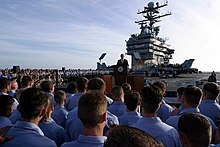Stephen Colbert at the 2006 White House Correspondents' Dinner
Colbert's performance, consisting of a 16-minute podium speech and a 7-minute video presentation, was broadcast live across the United States on the cable television networks C-SPAN and MSNBC.
[3] He spoke in the persona of the character he played on Comedy Central's The Colbert Report, a parody of conservative pundits such as Bill O'Reilly and Sean Hannity.
James Poniewozik of Time noted that whether or not one liked the speech, it had become a "political-cultural touchstone issue of 2006—like whether you drive a hybrid or use the term 'freedom fries'".
[12] More than 2,500 guests attended the event,[13][14] including First Lady Laura Bush, Chairman of the Joint Chiefs of Staff Peter Pace, U.S. Attorney General Alberto Gonzales, China's Ambassador Zhou Wenzhong,[15] AOL co-founder Steve Case, model and tennis player Anna Kournikova, and actor George Clooney.
[16][17] Colbert spoke directly to President Bush several times, satirically praising his foreign policy, lifestyle, and beliefs, and referring to his declining approval rating and popular reputation.
Most of the speech was prepared specifically for the event, Colbert's long-time writing partner, Paul Dinello, helped him with the text, and together they went over it the night before.
He alluded to outsourcing to China and satirized the traditional Republican opposition to "big government" by referring to the Iraq War.
He then used Laura Bush's reading initiative as a springboard to mock-criticize books for being "elitist",[18] and harshly criticized the White House Press Corps—hosts of the event—and the media in general.
Addressing the audience, he remarked: Over the last five years, you people were so good—over tax cuts, WMD intelligence, the effect of global warming.
[18]Colbert also criticized the White House Press Corps for what was widely perceived as its reluctance to question the administration's policies, particularly in regard to the lead up to the 2003 invasion of Iraq, saying: But, listen, let's review the rules.
[18][24]For the remainder of his speech, Colbert joked about other people in the audience, including Peter Pace, Antonin Scalia, John McCain, and Joe Wilson.
[25][26] This was in stark contrast to the warm reception accorded to a skit featuring Bush and his look-alike, Steve Bridges, which immediately preceded Colbert's monologue.
[3][7] At the end of his monologue, Colbert introduced what he characterized as an "audition" video to become the new White House Press Secretary—Scott McClellan had recently left the position.
[28] At one point, Colbert picks up an emergency phone and explains that Thomas "won't stop asking why we invaded Iraq".
[32] Cable channel C-SPAN broadcast the White House Correspondents' Dinner live, and rebroadcast the event several times in the next 24 hours, but aired a segment that excluded Colbert's speech.
[33] The trade journal Editor & Publisher was the first news outlet to report in detail on Colbert's performance, calling it a "blistering comedy 'tribute'" that did not make the Bushes laugh.
[16] The most extensive print coverage came from USA Today, which dedicated more space to Colbert's performance than to President Bush's skit.
[36] The day after the dinner, Howard Kurtz played clips of Colbert's performance on his CNN show Reliable Sources.
[41] On his show, Colbert joked that the unenthusiastic reception was actually "very respectful silence" and added that the crowd "practically carried me out on their shoulders" even though he was not ready to leave.
[2] Congressional Quarterly columnist and CBS commentator Craig Crawford found Colbert's performance hilarious, but observed that most other people at the dinner did not find the speech amusing.
[50] Fellow commentator Kurtz concurred, noting that the video was carried on C-SPAN and was freely available online; he also played two clips on his own show.
On May 15, The New York Times' public editor, Byron Calame, wrote on his blog that more than two hundred readers had written to complain about the exclusion of any mention of Colbert from the paper's initial lengthy article covering the dinner.
But he also noted that the paper should have printed an in-depth article specifically covering Colbert's speech in the same issue, rather than waiting until days after the fact.
Politician Steny Hoyer felt that Colbert had gone too far, telling the newspaper The Hill that "[Bush] is the President of the United States, and he deserves some respect".
[50] On The Daily Show, Jon Stewart remarked, tongue in cheek, "apparently [Colbert] was under the impression that they'd hired him to do what he does every night on television".
[11] Attorney and columnist Julie Hilden concluded that Colbert's "vituperative parody" might have been unfair under different circumstances, but noted that Bush's record of controlling bad press created a heightened justification for people to criticize him when they got the chance.
"[67][68][69][70] Canadian Broadcasting Corporation News Online columnist Heather Mallick wrote, "Colbert had the wit and raw courage to do to Bush what Mark Antony did to Brutus, murderer of Caesar.
[72] Time's James Poniewozik noted that in the "days after Stephen Colbert performed at the White House Correspondents' Dinner, this has become the political-cultural touchstone issue of 2006—like whether you drive a hybrid or use the term 'freedom fries'".
[11] Arianna Huffington reported that Colbert told her he had specifically avoided reading any reviews of his performance, and remained unaware of the public's reaction.
[74] Six months later, New York Times columnist Frank Rich called Colbert's after-dinner speech a "cultural primary", christening it the "defining moment" of the United States' 2006 midterm elections.

